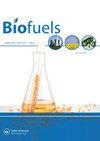The impacts of nano fuels containing Fe-Ni-TiO2/activated carbon nanoparticles on diesel engine performance and emission characteristics
IF 2.6
4区 工程技术
Q3 ENERGY & FUELS
引用次数: 0
Abstract
Abstract . Biofuels, which are widely used as alternative fuels to reduce fossil fuel consumption and replace them with fossil fuel-like energy sources, are increasingly being supplemented with nanoparticles (NP) to overcome their limitations, including lower energy content and higher emissions. The study aimed to examine the impact of Fe-Ni-TiO2/activated carbon (AC) nanoparticles, produced by the authors, on engine performance and emissions when added to diesel/biodiesel fuel blends. The produced Fe-Ni-TiO2/AC NP was employed as an additive in palm oil (PO)/diesel fuel blends at 50 and 100 ppm concentrations. The results revealed that compared to standard diesel, employing Fe-Ni-TiO2/AC NPs lowered emissions including smoke, carbon monoxide (CO), and hydrocarbon (HC) in all fuel blends while increasing nitrogen oxide (NOx). In the DNP30-100 fuel blend at 2500 W engine load, there was an increase in NOx by 8% and a decrease in CO, HC, and smoke emissions by 70.3%, 86.3%, and 57.5%, respectively, compared to standard diesel. Furthermore, a decrease of 11.38% was observed in brake-specific fuel consumption, while brake thermal efficiency increased by 16.59% compared to diesel. The overall results suggest that using Fe-Ni-TiO2/AC as an additive in a diesel–biodiesel fuel blend can improve engine performance and decrease emissions.含Fe-Ni-TiO2纳米燃料/活性炭纳米颗粒对柴油机性能和排放特性的影响
摘要生物燃料被广泛用作替代燃料,以减少化石燃料的消耗,并以类似化石燃料的能源替代化石燃料。目前,生物燃料越来越多地被纳米颗粒(NP)补充,以克服其局限性,包括较低的能量含量和较高的排放。该研究的目的是检测作者生产的Fe-Ni-TiO2/活性炭纳米颗粒添加到柴油/生物柴油燃料混合物中对发动机性能和排放的影响。制备的Fe-Ni-TiO2/AC NP作为棕榈油(PO)/柴油混合物的添加剂,浓度分别为50和100 ppm。结果显示,与标准柴油相比,使用Fe-Ni-TiO2/AC NPs降低了所有燃料混合物中的烟雾、一氧化碳(CO)和碳氢化合物(HC)排放,同时增加了氮氧化物(NOx)。在2500 W发动机负荷下,DNP30-100混合燃料与标准柴油相比,NOx排放量增加了8%,CO、HC和烟雾排放量分别减少了70.3%、86.3%和57.5%。此外,与柴油相比,制动比油耗降低11.38%,而制动热效率提高16.59%。总体结果表明,在柴油-生物柴油混合燃料中使用Fe-Ni-TiO2/AC添加剂可以提高发动机性能并减少排放。
本文章由计算机程序翻译,如有差异,请以英文原文为准。
求助全文
约1分钟内获得全文
求助全文
来源期刊

Biofuels-Uk
Energy-Renewable Energy, Sustainability and the Environment
CiteScore
5.40
自引率
9.50%
发文量
56
期刊介绍:
Current energy systems need a vast transformation to meet the key demands of the 21st century: reduced environmental impact, economic viability and efficiency. An essential part of this energy revolution is bioenergy.
The movement towards widespread implementation of first generation biofuels is still in its infancy, requiring continued evaluation and improvement to be fully realised. Problems with current bioenergy strategies, for example competition over land use for food crops, do not yet have satisfactory solutions. The second generation of biofuels, based around cellulosic ethanol, are now in development and are opening up new possibilities for future energy generation. Recent advances in genetics have pioneered research into designer fuels and sources such as algae have been revealed as untapped bioenergy resources.
As global energy requirements change and grow, it is crucial that all aspects of the bioenergy production process are streamlined and improved, from the design of more efficient biorefineries to research into biohydrogen as an energy carrier. Current energy infrastructures need to be adapted and changed to fulfil the promises of biomass for power generation.
Biofuels provides a forum for all stakeholders in the bioenergy sector, featuring review articles, original research, commentaries, news, research and development spotlights, interviews with key opinion leaders and much more, with a view to establishing an international community of bioenergy communication.
As biofuel research continues at an unprecedented rate, the development of new feedstocks and improvements in bioenergy production processes provide the key to the transformation of biomass into a global energy resource. With the twin threats of climate change and depleted fossil fuel reserves looming, it is vitally important that research communities are mobilized to fully realize the potential of bioenergy.
 求助内容:
求助内容: 应助结果提醒方式:
应助结果提醒方式:


